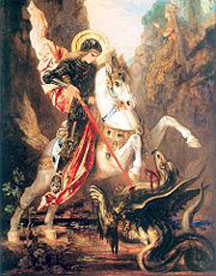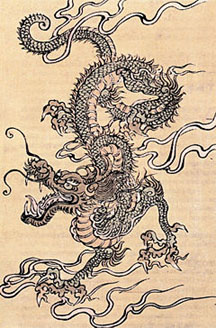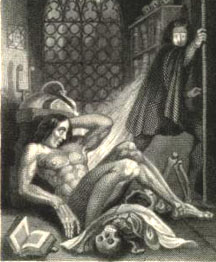
Front cover, John Gardner's Grendel (1971)
| This is a work in progress: lots of writing, formatting, revising, proofing left to do! — David McMurrey |

The big bad scary woolly monster of professional writing is the passive voice. For various reasons, people become convinced that the passive voice must be avoided at all costs. This may because some teachers believe in the passive-voice superstition, or else they are misunderstood by their students. Writing students tend to turn highly conditional guidelines into absolute rules. For example, "avoid the passive voice unless the subject is obvious or irrelevant" can easily become "Never use the passive!"
But an absolute injunction against ever using the passive voice is crazy. The passive voice is an important tool in our language. We could not do without it. But it is also easily misused and abused, which causes wordy, unclear, umemphatic writing.
In this chapter, you'll learn what the passive voice is, how to identify it, how it can be both a useful tool and a problem, and how to convert passive-voice sentences to active-voice sentences.
First of all, just what is this oft-misunderstood monster called the passive voice? Our language has two voices: active and passive. Here's an example of an active voice sentence:
Active voice: Congress passed the appropriations bill.
If you've read the characters-subjects chapter, you know that the character and the subject are one in the same here—Congress. If you read the actions-verbs chapter, you can also see that the action and the verb are also one in the same—passed.
Just about any active-voice sentence can be converted into passive voice, as is done here:
Passive voice: The appropriations bill was passed by the Congress.
In a passive-voice conversion, the subject Congress moves toward the end of the sentence, but it still is what the characters-subjects chapter calls the true "character" of the sentence. Also, in the passive-voice conversion, the direct object (if there is one) moves toward the beginning of the sentence, in this case, bill.
Passive voice:Actually, there are two types of passive voice: one in which the true character is shown; the other in which the true character is hidden:
Passive voice type 1:
The appropriations bill was passed by the Congress.
Passive voice type 2:
The appropriations bill was passed.
As you can see, the type 2 version could easily be misunderstood. Of course, we all know that Congress passes bills; plus, the context may have already supplied that information. However, passive-voice type 2 can lead to major communication problems. Consider these examples:
Passive voice type 2:
Your name should be entered into the blank.
Passive voice type 2:
The O-rings should be checked for proper elasticity.
In the first example, the user may be confused: should she enter her name, or should the system have entered it for her? In the second example, whose responsibility is it to check those O-rings? If everybody thinks someone else is going to check the O-rings, it's possible that no one will check them.

People in authority often view the passive voice as giving their statements more strength:
Passive voice type 2:
If your project is late, your grade will be reduced by one letter.
Passive voice type 2:
Violators will be prosecuted to the maximum limit of the law.
In the first example, the teacher may feel that saying I will reduce your grade... sounds weak, whereas the passive construction makes it sound like the whole college—all the buildings, all of the faculty, everything—is going to rise up and deduct those points from that late paper. The same thing is going on in the second example, except that it's clear who the true character here is, who'll do the prosecution. But it sounds menacing, doesn't it?
Passive voice can lurk in all areas of a sentence, in all its nooks and crannies. Sometimes, sentences can contain more than one passive construction. So far, you've seen examples where the main clause contained the passive. Passive voice can also lurk in dependent clauses and infinitive phrases:
Passive voice in a dependent clause:
Although the appropriations bill was passed, the President may veto it.
Passive voice in an infinitive phrase:
Although Congress passed the appropriations bill, it is likely to be vetoed.
And who knows? Passive voice may lurk in even other areas of sentences. Be on guard!
If you are confident you can identify passive-voice constructions, use this exercise to test yourself:
In this section, you'll see how to convert passive-voice constructions to active voice. Most of the examples you'll see here are rather awful, but a few will seem perfectly acceptable. Always keep in mind that the passive is not always wrong—not absolutely evil. Your focus here is to practice converting active to passive.
Active voice:First of all, make sure you can recognize the passive voice. It's easy enough to recognize passive-voice type 1, where by phrase is shown:
Passive voice: The appropriations bill was passed by the Congress.
Passive-voice type 1 always has some form of the be verb, followed by the past participle of a verb, followed by by. But watch out! None of these examples use passive voice:
Non-passive voice:
The boy was under the lemon tree.
Non-passive voice:
The boy was standing by the gate.
Non-passive voice:
The rake was located by the gate.
A rake can't locate anything, can it?

However, recognition is not so easy with passive-voice type 2. For this type, use the by-whom or by-what trick:
Passive voice: Although the appropriations bill was passed, the President may veto it.
You can rightfully ask the bill was passed by whom or by what? However, it makes no sense to ask the President may veto it by whom or what?
Now, consider the following passive-voice sentences followed by the active-voice conversions. Cover up the active-voice versions to test yourself.
Passive voice: In the 1960s, the intellectual world was polarized into the infamous "two cultures" of C. P. Snow.
The book Two Cultures did this polarization (between the the sciences and the arts). You can tell this sentence contains passive voice with the by-whom or by-what test: was polarized by whom or what? We can treat C.P. Snow as the subject culprit. In this case, the passive voice doesn't seem offensive; the writer may want to emphasize the intellectual world.
Active voice: In the 1960s, C. P. Snow polarized the the intellectual world with his infamous "two cultures" concept.
Passive voice: Culture was defined by Matthew Arnold as the best that has been thought and said in the world.
This sentence contains two, if not three, passive constructions: you can tell by testing with was defined by whom or what? and has been thought or said by whom? Converting the first passive is easy, but not the second. Who's been doing all this thinking and saying? Writers, artists, philosophers, thinkers, novelists, and so on. It should be obvious to most readers that these sorts of people have been doing all this thinking and saying. Converting the second passive is useless.
Active voice: Matthew Arnold defined culture as the best that has been thought and said in the world.
Passive voice: This definition was taken by many humanists of Snow's generation simply to mean literature.
The conversion to active voice may seem like a good idea here. But if you believe that starting sentences with "old" information (echoing something that was "new" in previous sentences), the passive version might be preferable: This definition refers to the idea presented in the preceding example.
Active voice: Humanists have taken this definition of Snow's generation simply to mean literature.
Passive voice: In short, science is perceived to be antagonistic to the human spirit.
By whom or by what? The author here believes that this is how people in general view or think about science. But does this conversion make any real improvement?
Active voice: In short, people in general perceive science as antagonistic to the human spirit.

But let's stop floundering about with the gray areas of the passive-active controversy. Let's look at some seriously awful passive voice:
Passive voice: A religious furor difficult to imagine today was caused by the publication of Darwin's book On the Origin of Species.
Well, the passive is not so terrible here. This is a passive-voice type 1 because the true character publication is stated.
Active voice: The publication of Darwin's book On the Origin of Species caused a religious furor difficult to imagine today.
Passive voice: A God who certainly did not play dice was envisioned by Einstein.
This is what we are talking about! Notice how cleaner, more direct, and more readable the active-voice version is:
Active voice: Einstein had a vision of a God who certainly did not play dice.
Passive voice: Philosophy is held by many to have been blighted for years by the Vienna Circle's concentration on meaning and language.
This whopper contains two passive-voice constructions, both type 1: is held by and to have been blighted...by.
Active voice: Many believe that the Vienna Circle's concentration on meaning and language blighted philosophy for years.
Passive voice: A perceived spiritual impoverishment is associated by society with the huge success of science.
Another awkward passive voice sentence that feels backward. At least we know who does the associating!
Active voice: Society associates a perceived spiritual impoverishment with the huge success of science.
Passive voice: Science is blamed for various psychological and physical ills, often associated with its technological application, by society.
This passive construction is laughable: look how many words you have crawl though to get the by phrase!
Active voice: Society blames science for various psychological and physical ills, often associated with its technological application.
Passive voice: The belief that science, given time, can solve everything can be come across even among bright undergraduates.
Are you kidding: can be come across?
Active voice: Even among bright undergraduates, one can come across the belief that, given time, science will solve everything.
Passive voice: Paradoxically, what it is talking about is not ultimately known by science.

Hard to imagine a context in which is this convoluted passive construction would be useful or effective.
Active voice: Paradoxically, science ultimately does not know what it is talking about.
Passive voice: That there exists a real world that is corresponded to by our theories cannot be proven.
Two passive constructions here: the outer one is type 2; the inner one is type 1. cannot be proven by whom or what? Scientists is certainly one possibility; philosophers might be another; even we would work. It might be okay to leave this outer passive as is: the existence of a real world cannot be proved theoretically by anyone! However, that inner passive has got to go!
Active voice: Scientists cannot prove that there exists a real world which corresponds to our theories.
Passive voice: What gravity really is can never be explained by science.
Is this revision a bit more comprehensible?
Active voice: Science can never explain what gravity really is.
Passive voice: A picture that transcends individual experiments and that seems to imply timeless universality is built up in our minds by scientific statements.
Notice in this whopper how many words you have to wade through to get from the grammatical subject to the grammatical verb. This is one of the common problems that passive-voice constructions create.
Active voice: Its statements about timeless universals build up a picture in our minds that transcends individual experimentation and that seems to raise timeless universality to a higher level.
If you read the characters-subjects chapter or the actions-verbs chapter, you saw some passive voice in those character-subject and action-verb separations.
Character-subject separation with nominalization: The amendment was passed through the cooperation of the president and Congress.
Here, cooperation is a nominalization. The sentence can be improved by revising with cooperated as the verb. The verb phrase was passed is a passive-voice construction, although it's hard to tell whether this is a type 1 or type 2. The phrase through the cooperation of the president and Congress is almost like by the president and Congress.
Revision: The president and Congress cooperated to pass the amendment.
Character-subject separation with nominalization: The invention of writing toward the end of the fourth millennium B.C. is credited to the Sumerians.

Here, invention is the nominalization; it is made possible by the passive construction is credited. In this case, we know who did the inventing although it is not introduced by by. The revision here is nicely succinct, although if writing or the invention of writing had been the focus of the paragraph, the passive voice might have been a better choice.
Revision: Sumerians invented writing toward the end of the fourth millennium B.C.
Character-subject separation with nominalization: Depictions of humorous fables in which inferior creatures are served by superior creatures that in nature prey upon the former were recorded in the Turin papyrus (1200—945 B.C.).
You could revise this by starting out with Egyptians of the Nineteenth or Twentieth Dynasty (1200—945 B.C.) recorded.... Instead of answering the question recorded by whom or by what, just change the verb to contained:
Revision:
The Turin papyrus (1200—945 B.C.) contains humorous fables in which inferior animals are served by superior creatures that in nature prey upon the former.
or
The Turin papyrus (1200—945 B.C.) contains humorous fables in which superior creatures serve inferior animals, which would normally be the prey of the former.
Character-subject separation with nominalization: The destruction of Egyptian papyri occurred by various phenomena, including fire, flood, demolition, and even microorganisms.
Revision: Egyptian papyri were destroyed by various phenomena, including fire, flood, demolition, and even microorganisms.
Had enough? If you are confident with what you've studied in this chapter, use this exercise to test yourself:
Passive voice has an important role in strengthening the coherence (or flow) of a sequence of sentences. Think of passive voice as a transition tool the same way words like "however," "therefore," and "for examle" act as transition tools.
Passive voice strengthens coherence in a sequence of sentences by enabling the old-to-new pattern. Readers have an easier time following the flow of discussion if one or both of these strategies are used:

You can ensure your mastery of the passive voice if you can take perfectly decent active-voice sentences and convert them to passive voice. You'll find the conversions easy at first, but they'll get harder. As you go through this section, cover up the active-voice versions, and see if you can make the conversions on your own.
Active voice: Aristotle bequeathed the laws of logic.
Simple. Just drag the end of the sentence to the beginning, convert the verb to passive, and drag dear old Aristotle to the end after the word by.
Passive voice: The laws of logic were bequeathed by Aristotle.
Active voice: Euclid deduced the properties of space from a set of axioms.
This one is trickier. The passive construction needs to snuggle in between the two phrases so that something is deduced from something else.
Passive voice: The properties of space were deduced by Euclid from a set of axioms.
Active voice: Archimedes applied mathematics to physics, and Diophantus gave us the first work on algebra.
Compound sentences can be loaded with passive voice too.
Passive voice: Mathematics was applied to physics by Archimedes, and the first work on algebra was given to us by Diophantus.
Active voice: Pythagoras gave us the vision of the world as Number.
You have to take the whole phrase following the verb, drag it to the beginning of the sentence, convert the verb to passive, not forgetting about us, and then construct the by phrase.
Passive voice: The vision of the world as Number was given to us by Pythagoras.
Active voice: Science is incapable of saying anything about consciousness, ethics, art and religious belief.
To make this conversion, you have to use the negative: change anything to nothing.
Passive voice: Nothing about consciousness, ethics, art and religious belief can be said by science.
Active voice: Descartes's important contribution to mathematics was to apply algebra to geometry.
This one is difficult. You have to disregard important contribution for the moment and then add it after you've done the passive conversion. You also have turn the verb into a nominalization.
Passive voice: The application of algebra to geometry was achieved by Descartes, one of his most important contributions to mathematics.
Active voice: Einstein showed that no universal meaning was to be attached to space or time on their own; instead, universal meaning could only be attached to the four-dimensional continuum of space-time.
This sentence already has two passive constructions, but see if you turn the first two words of the main clause into passive as well. In other words, see if you can rephrase so that the sentence ends with by Einstein. It will be a mess!
Passive voice: That no universal meaning was to be attached to space or time on their own and that universal meaning could only be attached to the four-dimensional continuum of space-time was shown by Einstein.
If you are confident that you can convert active-voice sentence to passives, use this exercise to test yourself.

Links to these exercises are provided at the end of the sections where they are relevant. But here they all are in case you read the text straight through:
Return to the table of contents
Information and programs provided by admin@mcmassociates.io.